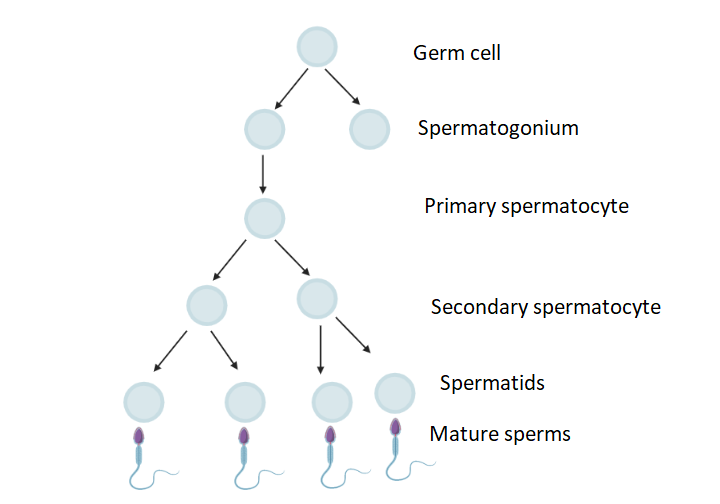
The number of spermatozoa, a single primary spermatocyte ultimately produces in spermatogenesis is
A. One
B. Two
C. Four
D. Eight
Answer
572.1k+ views
Hint: Sperms are the male gamete produced by the testis of the male reproductive system. The process called spermatogenesis is responsible for the origin and development of the sperm cell. Sperms are haploid cells which are capable of producing diploid zygote after fusing with the ovum.
Complete answer:
The process which involves the formation of the male gamete called haploid spermatozoa from the germ cells in the seminiferous tubules of the testis is called spermatogenesis. A biological cell that gives rise to the gametes of a sexually reproducing organism is called the germ cell. The immature cell called spermatogonial stem cells is derived from the stem cells. Two types of cells called type A and type B are produced by mitotic division of these cells. Type A cells are responsible for the replenishment of the stem cells, while type B is further differentiated into spermatocytes. Meiotic division of these primary spermatocytes produces secondary spermatocytes. This stage is called meiosis I. In meiosis II, secondary spermatocytes are further divided into two equal haploid spermatids. The spermatids are matured into spermatozoa by the process called spermiogenesis. The final stage of spermatogenesis is spermiogenesis where the spermatids are matured into spermatozoa. Thus, by mitotic division, the primary spermatocyte produces two secondary spermatocytes and the two secondary spermatocytes produces four haploid cells and four spermatozoa.

So, option C is the correct option.
Note: Sertoli cells play an important role in the process of spermatogenesis as the germ cells are in close contact with the Sertoli cells in the testis. It regulates the function of phagocytosis of residual cytoplasm that is left over from spermiogenesis. It secretes the substances which are important for initiating meiosis.
Complete answer:
The process which involves the formation of the male gamete called haploid spermatozoa from the germ cells in the seminiferous tubules of the testis is called spermatogenesis. A biological cell that gives rise to the gametes of a sexually reproducing organism is called the germ cell. The immature cell called spermatogonial stem cells is derived from the stem cells. Two types of cells called type A and type B are produced by mitotic division of these cells. Type A cells are responsible for the replenishment of the stem cells, while type B is further differentiated into spermatocytes. Meiotic division of these primary spermatocytes produces secondary spermatocytes. This stage is called meiosis I. In meiosis II, secondary spermatocytes are further divided into two equal haploid spermatids. The spermatids are matured into spermatozoa by the process called spermiogenesis. The final stage of spermatogenesis is spermiogenesis where the spermatids are matured into spermatozoa. Thus, by mitotic division, the primary spermatocyte produces two secondary spermatocytes and the two secondary spermatocytes produces four haploid cells and four spermatozoa.

So, option C is the correct option.
Note: Sertoli cells play an important role in the process of spermatogenesis as the germ cells are in close contact with the Sertoli cells in the testis. It regulates the function of phagocytosis of residual cytoplasm that is left over from spermiogenesis. It secretes the substances which are important for initiating meiosis.
Recently Updated Pages
Master Class 12 Economics: Engaging Questions & Answers for Success

Master Class 12 Physics: Engaging Questions & Answers for Success

Master Class 12 English: Engaging Questions & Answers for Success

Master Class 12 Social Science: Engaging Questions & Answers for Success

Master Class 12 Maths: Engaging Questions & Answers for Success

Master Class 12 Business Studies: Engaging Questions & Answers for Success

Trending doubts
Which are the Top 10 Largest Countries of the World?

What are the major means of transport Explain each class 12 social science CBSE

Draw a labelled sketch of the human eye class 12 physics CBSE

Why cannot DNA pass through cell membranes class 12 biology CBSE

Differentiate between insitu conservation and exsitu class 12 biology CBSE

Draw a neat and well labeled diagram of TS of ovary class 12 biology CBSE




